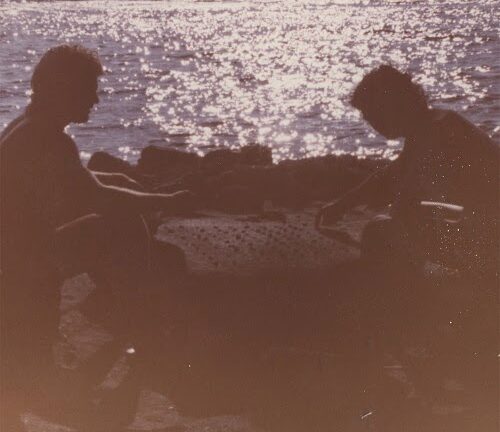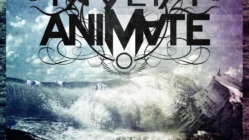Let me open up with this: Seahaven’s new record, Reverie Lagoon: Music for Escapism Only, is a masterpiece. Hailing from Torrance, Calif., Seahaven is an alternative punk/emo band with a whole lot of emotion portrayed through its songs. The band’s sound has changed drastically from its previous release, Winter Forever, but if you were a fan of Seahaven before, I think you’ll still be now. Reverie Lagoon contains 14 tracks that are meant to be listened to from front to back. Once you listen, I think you’ll agree that this album is a musical journey. As singer/guitarist Kyle Soto said, “This is a record to be listened to with headphones, lying in your bed, listening all the way through.” One of the first things I’ll say is that, musically, this record is much more basic than Seahaven’s previous material; however, for this album, I’d say one of the themes is “less is more.” The emotion and beauty portrayed from each track is a work of art on its own. The record begins with “Fifty-Four” as we hear a slow intro from a guitar, waves crashing and what sounds like whispers. With the drums adding an epic, powerful effect, this song sets the stage for the rest of the 51-minute-long record. “Andres” is an upbeat song, as well as melodic and beautiful. The drums are intricate and the combination of Soto’s sort of fast singing creates a song that stands out. “Silhouette (Latin Skin)” is simply one of the best songs on this record. As I stated before, “less is more” with this album and that is clearly shown in this song. Some words to describe this song are “very relaxing” and “serene.” This is the longest song, but it is enjoyable all the way through. “Wild West Selfishness” might be the strangest song on the record. The intro is eerie, but I think it’s the “heaviest” track on this album once everything finally kicks in. The drum beat is repetitive (another recurring theme), but it works perfect. One lyric that strikes me is “Don’t forget who’s watching you.” It gives me something to think about and it’s almost as if Soto is speaking directly to me. “On the Floor” has a repetitive lead and drum beat throughout, but it just works. Everything flows. I get a lonely feeling from this song, and this is a really quiet, mellow track. “Paseo de Las Estrellas” is an interlude track; it’s short and the vocals only come through the left headphone/speaker. This song has a mysterious feel, and it’s over soon enough.
“Highway Blues” is another one of my favourites. This is a perfect song to listen to on the beach. It’s lighthearted and the echoey effect on the vocals is something different. Solely vocals, acoustic guitar and some background sounds, this song is simple – but it’s definitely not one to overlook. “Flesh” has a strange sounding intro, especially how Soto sings during it. This song is the most energetic, it’s very catchy and it makes superb use of a tambourine. Soto also extends his vocal range, which adds to the quality of this song. If I had to pick a song that was most similar to Winter Forever, it would be this one.
“Whispers” is another interlude track. It’s repetitive, yet mesmerizing. The repetitiveness theme really shows throughout, but as I said, it is by no means a bad thing. The vocals are quiet and add to the mesmerizing effect. “Love to Burn” is an excellent song. The drums and soft vocals mix together to create a “cool” summery vibe. Something different is the use of a violin, which creates an overall beautiful blend of emotions in this song. I could listen to it over and over again. Seahaven really went all-out on this album, incorporating several different instruments. In addition to piano, the band makes use of a trumpet on track 11, “Solar Eclipse.” This song is self-reflective and one of my favourites on Reverie Lagoon, but you’ll have to listen and see what I mean.
We are then met with “Paseo de Las Estrellas (II),” which is very similar to the first part in all aspects. There are three interlude songs on this record, but they all play a key role to make everything flow together, as well as give you a break from the longer songs. “Karma Consequential” makes use of a piano as well, and this song is just plain beautiful with its nearing-the-end sound. The drum beat is repetitive, but it’s hard to tell when you get so wrapped up in the flow of the song. This song is almost six minutes, but it keeps my attention throughout. Seahaven gave a shot at writing longer songs and executed beautifully. “Four-Eleven” brings us to the end of the record. This song is similar to the first track, thus tying everything together and making this record an entire peace rather than segmented songs. It’s a beautiful song, with whispering in the background and waves crashing – just like the first track. This song is an amazing way to end Reverie Lagoon; everything eventually fades away, and then we are fast asleep in our beds. This record truly is for escapism only.
I had to go track-by-track on this record because each song has something unique to offer and has its own separate vibe/feeling. The members of Seahaven really stepped up their game on this album and – without a doubt – this is one the best records Run for Cover will ever release, in my opinion. As I said, it’s a masterpiece. Seahaven went for a much more basic approach to these songs, but more emotion is conveyed through them and the band’s overall sound has matured. I can’t wait for summer so I can have this album on repeat because it is certainly a summer record. Whether you’re driving around at sunset on the beach or comfortable in bed on a quiet night, Reverie Lagoon will take you through a journey time after time.




